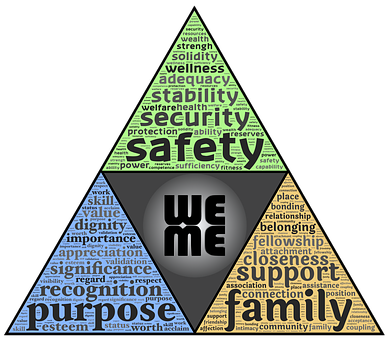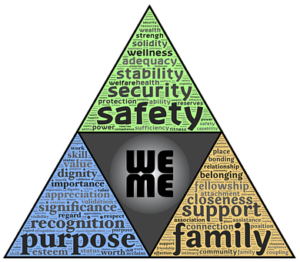
Caregivers: 7 Practical Yet Simple Steps to Improved Family Communication
 “Constant kindness can accomplish much. As the sun makes ice melt, kindness causes misunderstandings, mistrust, and hostility to evaporate.”—Albert Schweitzer
“Constant kindness can accomplish much. As the sun makes ice melt, kindness causes misunderstandings, mistrust, and hostility to evaporate.”—Albert Schweitzer
Meet Barbara:
“Rant alert! As if caring for your loved ones through terminal illness or behavior issues isn’t bad enough—or even navigating systems that promise to offer help but are broken, at best. But what gets me is when your f*****g siblings can’t find any f*****g compassion or consideration to give you a f*****g chance to get back up on your feet after being knocked down time and time again for years—whether it be emotionally, physically, financially, or mentally.
“My mum moved into residential care two weeks ago, and she loves it. Why? Because she has company and is well cared for. I fully supported her decision. But my brothers? Oh no! One stopped talking to me. The other doesn’t understand why I haven’t found a job and moved out of the family home, and he wants me to pay for my mum’s residential care.
“Times like these are when I’m convinced that I’m adopted. I’m so f*****g angry! I have had to put my dreams on hold constantly, and I now finally get a chance to rebuild my business with some great products and services but with no f*****g support from my family at all!”
Barbara and her family have failed to communicate adequately.
Interestingly, during the same week, she posted her entry in the online support group, another caregiver member of the group posted these words:
“I HATE my siblings. That is all.”
This member received twenty-nine responses to her, with many sharing her sentiments and saying, “Me too!”
What is going on?
Why is there so much hatred among family members?
Where a good relationship exists, the caregiver, patient, and family laugh together even when they make mistakes.
Conversely, where there is friction, situations sometimes erupt and reveal communication gaps.
Barbara, for example, felt misunderstood and unheard by her brothers when siblings should be part of a robust, supportive circle tied together by a strong familial bond.
Instead, they only have feelings of bitterness, anger, and resentment toward each other.
What You Can Do About Family Conflict
You must first understand the reasons behind a conflict before taking steps to resolve it.
One family therapist explains an important reason why brothers and sisters are so often in conflict:
“Each family has a certain number of resources, some emotional and some material. When siblings fight, they’re usually competing for these resources, which include everything from paternal love to money and clothes.”
In Barbara’s situation, some of the conflicts seem to be about money, as one of her brothers believed that she should pay for their mother’s residential care.
Other issues in Barbara’s family involve feelings of resentment—at least from Barbara’s perspective. One brother wants Barbara to move out of the family home and be on her own, which could also be about money.
But the only way Barbara and her brothers can get to the core of their disputes is to talk openly to each other face-to-face.
Such a meeting involves interpersonal communication skills, where the siblings can exchange information, feelings, and meaning through verbal and nonverbal communication, ideally in person or on a conference call.
But I believe the most critical communication skill is effective and active listening, which builds trust. Through it, you can make and bring opposing ideas closer together.
Conflicts or clashes often occur due to family stress and other negative emotions, such as worry, anger, grief, guilt, and so forth.
These negative emotions affect not only your health but family dynamics as well.
Barbara might have been experiencing all sorts of inner emotional turmoil, which caused her to express herself so vehemently in her online post.
Indeed, she must resolve the issues with her brothers, or she will need professional mental help.
In the field of psychotherapy, there exist four methods of conflict resolution.
You may have learned these in college or the workplace. They include:
- Competition. This method refers to a power struggle involving who gets the upper hand. The result is, “I win, and you lose.”
- Accommodation. You concede to resolve issues with this style. The result is, “I lose, and you win.”
- Compromise. Many believe this is the best way to resolve conflict, resulting in “I lose, and you lose.”
- Cooperation. Referred to as a “win-win” situation, both parties cooperate for the best outcome in both their favor.
Conflict Can Happen in Any Relationship
Regardless of the type of relationship, there are four common causes of severe disagreements or disputes:
- Lack of shared understanding.
- Poor communication skills.
- Unclear or unfair expectations.
- Power plays and manipulations.
Use These Seven Simple Steps to Improve Your Family Communication
Step 1: Prepare to listen with understanding.
In Barbara’s case, she should calmly approach her brothers and ask to meet with them face-to-face, if possible. She can plan to avoid being defensive. She might say to them in a friendly tone of voice, “Let’s talk.”
When approaching her brothers, Barbara should recall what she has learned about nonverbal communication skills and remember that it is not only what she says but, also how she presents her case.
Step 2: Engage in active listening.
If Barbara’s brothers agree to a meeting, she must engage in active listening. She will acknowledge whatever her brothers say by nodding or making statements such as, “I see,” or “I get it.” However, this is not to be confused with obeying or acquiescing. She should ask sincere questions and express herself with mildness and respect for better results.
Step 3. State your position tactfully.
In this step, you should avoid blame, shame, or guilt to present your case, as doing so would be ineffective. Using such a tactic could backfire in Barbara’s case, and her brothers might instead become defensive and argumentative. Use statements that start with “I.”
Step 4. Give the benefit of the doubt.
Open your discussion by expecting the best results. Barbara, for instance, could assume right away that her brothers will be sympathetic to her point of view, putting her into a more positive frame of mind instead of expecting the worse and thus feeling tense or nervous. Repeating the phrase, “I’m sure they’ll understand how I feel,” may help.
Step 5. Be hard on the problem.
Focus on the issue at hand but do not attack the people. Avoid generalizing by using statements such as, “You always do this” or “You never do that.”
Step 6. Resist casting blame.
The only time casting blame is adequate is when you’re blaming yourself, which will denote humility. Make statements such as, “I messed up; I apologize.” Blaming others will only cause resentment and will reinforce their position.
Step 7. Negotiate with confidence.
Convince yourself that you are not afraid to confront the issues. Explain that people have different needs, wants, and aspirations. If you have a problem with your family and it’s causing you distress, it’s time to speak up. Nearly everything is negotiable. Aim for a win-win solution. It may not be easy, but it is well worth the effort.
Show Empathy
In addition to the above seven steps, showing empathy can be beneficial, as some refer to this quality as “The Bedrock of Conversation.”
How so?
According to Dr. Bernard Guerney of Pennsylvania State University:
“Empathy is the capacity to appreciate the other person’s feelings and point of view—whether you agree with him or not. Empathy is the foundation upon which we build everything else.”
Thus, to resolve conflict and preserve the relationship, we must be willing to talk about the problem without making the other person defensive or angry.
Most people confuse empathy—the appreciation and respect for the other person’s point of view—with agreement with the other person’s position.
That is not the case.
According to Dr. Guerney, empathy allows you to put yourself mentally in the other person’s shoes so that you can feel and think as they do. And you will find that doing so will result in understanding, appreciation, and respect, even if you disagree with their point of view.
Empathy shows you care.
Empathy serves to foster better communication between people’s want and need.
To Summarize:
- Communication is the exchange of thoughts and feelings.
- Miscommunication is a failure to communicate adequately.
- As with all conflict, family conflict occurs due to a lack of shared understanding, poor communication skills, unclear or unfair expectations, and power plays and manipulations.
As a caregiver, I implore you to follow the seven practical yet simple steps in this article and watch communication within your family improve.
With the stress, overwhelm, and struggles you are undoubtedly experiencing in caring for your loved one, you (all of us) need family!
We must try to get along.
Make your caregiving days less stressful and more loving, joyful, and peaceful through effective communication with family.
Please begin today to put into practice the ideas you have learned from this article to have better family communication.
**** ****
Source for this article:
A Family Caregiver’s Guide: 7 Secrets to Convert Negative Triggers to Positive Emotions, published 2019.
Find it on Amazon here:
http://www.amazon.com/dp/B07T8KSC34




